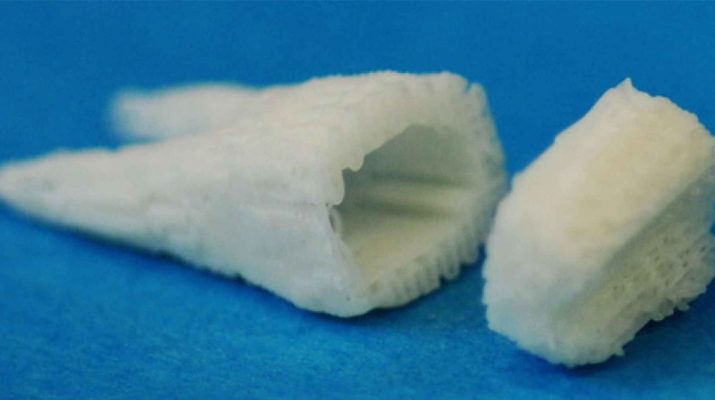For many years, those who need a tooth replaced due to cavities, decay, or damage had only two main options: dentures or dental implants.
These two solutions resolve the issue of lost teeth, but each one has an extended recovery time and high costs. Both procedures also have the potential to create new dental health issues for the wearers.
Dentures, the most popular answer for complete loss of teeth, make it difficult for many wearers to eat and speak normally.
Along with these adjustment issues to heal teeth, dentures can be the cause of significant slipping and pain if they are not properly fitted.
With dental implants, there’s risk of infection, injury, and nerve damage, while the tooth may not fuse correctly to the metal implant. In addition, the entire implant process can take up to 18 months.
According to Dentistry iQ:
“Despite being the preferred treatment for missing teeth today, dental implants can fail and have no ability to “remodel” with the surrounding jaw bone, which undergoes necessary and inevitable changes throughout a person’s life.”
PopularScience adds:
“Although dental implants are available, the healing process can take months on end, and implants that fail to align with the ever-growing jawbone tend to fall out. If only adult teeth could be regenerated, right?
According to a study published in the latest Journal of Dental Research, a new tissue regeneration technique may allow people to simply regrow a new set of pearly whites.”
A new groundbreaking discovery might make implants and dentures a thing of the past. This could change the lives of millions of people around the world.
Fortunately, scientists have developed a more natural and comfortable solution to replace missing teeth, by regrowing the tooth in the patient’s mouth.
At his Tissue Engineering and Regenerative Medicine Laboratory, Dr. Jeremy Mao and his team are able to direct the body’s stem cells to develop a tooth based on a three-dimensional scaffold made of natural materials.
These various issues could be avoided if there was a procedure for growing new teeth in the location of lost teeth.
Benefits of Stem Cell Dental Implants
The result is a better-fit, natural tooth, in as little as nine weeks. According to Underground Health Reporter, this represents a “much-needed medical advancement,” especially for the 26% of adultswho have lost all of their permanent teeth by age 75.
Dr. Mao sees the approach, which eliminates the need to grow teeth in a Petri dish, as more cost-effective one “for patients who cannot afford or who aren’t good candidates for dental implants.”
The Columbia University Medical Center identifies other key advantages of this approach to regrow teeth: “Factor in the faster recovery time and the comparatively natural process of regrowth (as opposed to implantation), and you have a massively appealing dental treatment.”
Healthier and more comfortable, a new tooth developed using stem cells also has the ability to adapt and move with the mouth, preventing discomfort and more serious issues later on.
This gives the approach a distinct advantage over implants and dentures, which can become ill-fitting over time.
The clear advantages of stem cell implants over other solutions makes it an exciting development in the field of dentistry.
Like Dr. Mao’s group, other teams of scientists are working on advancing this tooth technology to make it available for widespread use.
Dr. Rena d’Souza in the University of Utah School of Dentistry, as well as other across the world are dedicated toward this reality.
Underground Health Reporter claims:
“This is a much-needed medical advancement, especially considering that by age 74—26% of adults have lost all of their permanent teeth.”
Dentistry iQ adds:
“A new technique pioneered at the Tissue Engineering, and Regenerative Medicine Laboratory of Dr. Jeremy Mao, Edward V. Zegarelli Professor of Dental Medicine, and a professor of biomedical engineering at Columbia University can orchestrate the body’s stem cells to migrate to three-dimensional scaffold that is infused with the growth factor. This can yield an anatomically correct tooth in as soon as nine weeks once implanted in the mouth.”
“Dental implants usually consist of a cone-shaped titanium screw with a roughened or smooth surface and are placed in the jaw bone.
While implant surgery may be performed as an outpatient procedure, healing times vary widely, and successful implantation is a result of multiple visits to certified clinicians, including general dentists, oral surgeons, prosthodontists, and periodontists.”
Growing new a new tooth will take about two months. It will be less invasive and should also be less expensive!
Dr. Jeremy Mao maintains:
“Key consideration in tooth regeneration is finding a cost-effective approach that can translate into therapies for patients who cannot afford or who are not suitable candidates for dental implants.
Cell-homing-based tooth regeneration may provide a distinct pathway toward clinical translation.”
According to Columbia University Medical Center:
“Dr. Mao’s technique not only eliminates the need to grow teeth in a Petri dish, but it is the first to achieve regeneration of anatomically correct teeth by using the body’s own resources.
Factor in the faster recovery time and the comparatively natural process of regrowth (as opposed to implantation), and you have a massively appealing dental treatment.”
The university has already filed patent applications for the new dental technology and is trying to find associates to help commercialize the process.
Meanwhile, Dr. Mao is considering the best approach for applying this groundbreaking technique to cost-effective clinical therapies.
You watch a short video about the research and the procedure below:
While it may still be some time before the stem cell implant process is ready for human patients, successes in this area of dental surgery can offer hope to those who fear the ongoing problems of dentures and dental implants.

